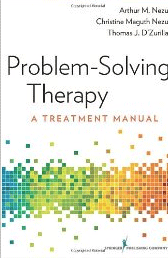“Problem-Solving Therapy: A Treatment Manual”

“Problem-Solving Therapy: A Treatment Manual”
By Arthur M. Nezu, Christine Maguth Nezu, and Thomas J. D’Zurilla
Springer Publishing Company
New York, N.Y., 2013
Resource provides ‘terrific’ aid for practitioners
Reviewed by James K. Luiselli, Ed.D., ABPP, BCBA-D
Problem-solving therapy (PST) is considered a psychosocial treatment within a cognitive-behavioral orientation. At its most basic level, PST teaches people to identify and define life problems, generate plausible solutions, implement solution-focused action plans, and evaluate intervention effectiveness. This book, written by three eminent clinicians and researchers, is a PST treatment manual for mental health professionals in psychology, psychiatry, counseling, social work and medicine.
The empirical basis for PST is substantive and impressive. For example, there is evidence-based support for PST in treating depression, generalized anxiety disorder, schizophrenia, posttraumatic stress disorder and other clinical conditions. Additionally, PST is adaptable to individual and group therapy formats, via telephone counseling and over the Internet. In several initial chapters, the book firmly establishes the treatment efficacy and effectiveness of PST before instructing the reader about methods and techniques.
After addressing assessment and treatment planning, general clinical considerations and basic learning principles, the authors cover several areas that can be approached through PST: cognitive overload, emotional dysregulation, maladaptive stress, negative thinking and low motivation. They then direct the reader in PST implementation by presenting “toolkits” that can be applied to each area.
In function, these “toolkits” serve as procedural guides with respective therapeutic rationale, methods, case illustrations, summary of key training points, patient handouts and suggested practice assignments. They are a terrific aid for understanding PST and application with specific problems.
Among many positive features the book is based on solid research, much of it conducted by the authors and procedures that have good empirical support among clinicians. I have no doubt that by reading the book, most mental health professionals can learn PST and use it meaningfully in their practices. The various patient handouts included with the book also simplify PST to ensure treatment integrity. There is even a publisher’s Web site link where other forms and helpful information can be downloaded.
Professionals from different disciplines and theoretical perspectives will enjoy this book because PST engenders cognitive, behavioral, affective and experiential treatment components. It is also difficult to argue against the therapeutic merits of identifying life problems and constructing corrective plans that consider the whole person and are skills-focused. “Problem-Solving Therapy: A Treatment Manual” is a laudable and distinctive resource that contributes to contemporary and exemplary psychotherapy in a big way.
James K. Luiselli, Ed.D., ABPP, BCBA-D, is senior vice president, applied research, clinical training and peer review at the May Institute in Norwood, Mass.
Learn more about the book: Problem-Solving Therapy: A Treatment Manual
